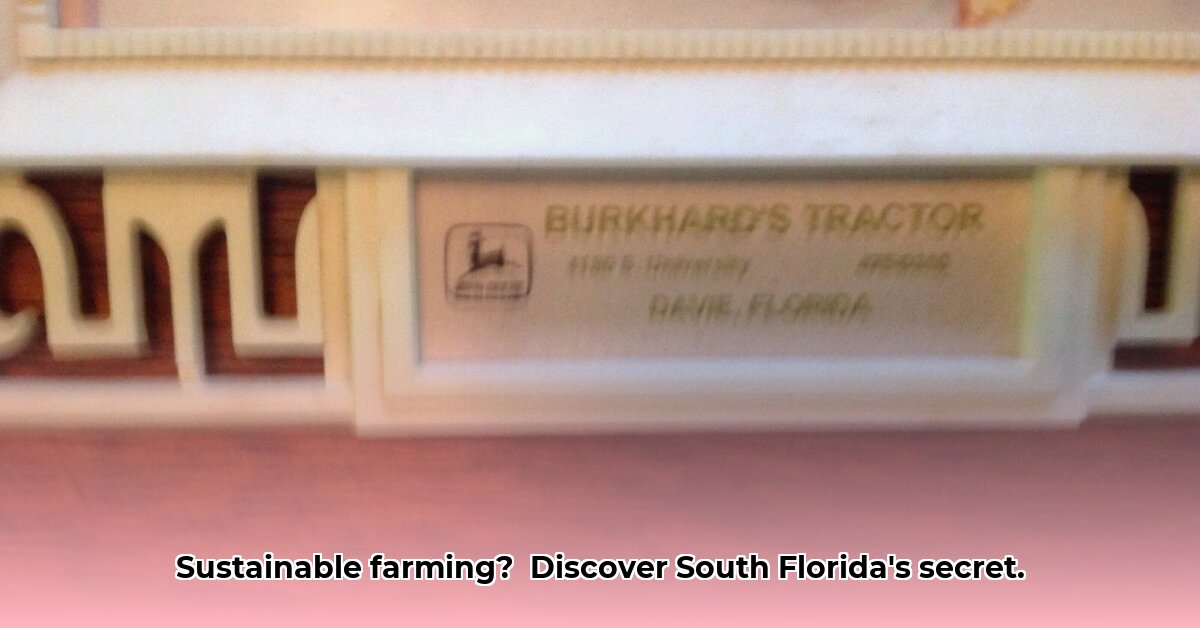
South Florida's agricultural landscape faces unique challenges: intense heat, water scarcity, and the imperative for efficient land use. Farmers need innovative solutions, and companies like Burkhart Tractor Davie (BTD) play a crucial role in this transition to sustainable practices. This article analyzes BTD's contribution to environmentally conscious farming in the region, examining their equipment offerings, and outlining a path toward greater sustainability. For more information on BTD, visit their website: Burkhart Tractor Davie.
Assessing Burkhart Tractor Davie's Sustainability Efforts
Burkhart Tractor Davie boasts a 40+ year history serving South Florida farmers. Their partnerships with leading brands like Stihl demonstrate a commitment to reliable, high-quality equipment. However, a detailed analysis of their sustainability initiatives is needed. While efficient service and rapid repairs are vital for farm operations, their public messaging regarding environmentally friendly equipment is currently limited. This raises critical questions: What proportion of their sales are electric or low-emission machines? What waste reduction and responsible sourcing practices are in place? We aim to provide answers.
Equipment Lineup and Environmental Impact
BTD's current equipment catalog includes brands like Scag, Wright, Cub Cadet, Ferris, and Stihl. This diverse selection caters to various farming needs, but a comprehensive assessment of its environmental footprint is crucial. This assessment requires a comparative analysis against more sustainable counterparts, taking into account several factors:
- Carbon Emissions: What are the greenhouse gas emissions of each machine throughout its lifecycle (manufacturing, operation, disposal)?
- Water Consumption: How much water is utilized during operation (e.g., irrigation systems)?
- Waste Generation: What is the amount of waste generated throughout the machine's use and eventual disposal? Are materials easily recyclable or reusable?
Addressing these questions will clarify the extent to which BTD's equipment actively facilitates sustainable farming practices in South Florida. For instance, how do the fuel efficiency ratings of BTD's mowers compare to electric alternatives? What is the average lifespan of their equipment before replacement becomes necessary?
A Data-Driven Path to Greener Practices
To fully evaluate BTD's contribution to sustainable agriculture, a multi-pronged approach is necessary:
Comprehensive Environmental Audit: A detailed assessment of every machine BTD offers, quantifying its environmental impact using standardized metrics. This audit should include lifecycle assessments, considering manufacturing, operation, and end-of-life disposal.
Transparent Communication: BTD should proactively communicate their sustainability initiatives to their customers. This includes clearly highlighting the environmental benefits of the equipment they offer and actively sharing data related to their sustainability efforts.
Strategic Partnerships with Sustainable Suppliers: Collaborating with manufacturers producing electric tractors, low-emission mowers, and other eco-friendly technologies is crucial for BTD's future sustainability.
Farmer Education and Support: Providing farmers with training and resources on sustainable farming practices and the responsible use of equipment is essential to maximizing the environmental benefits of the technology offered.
Long-Term Sustainability Strategy: Developing a comprehensive, closed-loop system, from responsible sourcing of materials to equipment recycling and reuse, is paramount for long-term success.
Comparative Analysis: Equipment Types and Sustainability
The following table illustrates the relative environmental impact of different equipment types. (Note: This is a simplified comparison. Precise data collection and analysis are essential for a definitive assessment).
| Equipment Type | Carbon Footprint (relative) | Water Usage (relative) | Waste Generation (relative) |
|---|---|---|---|
| Traditional Gas Mower | High | High | High |
| Electric Mower | Low | Low | Moderate |
| Hybrid Tractor | Moderate | Moderate | Moderate |
This data underscores the significance of transitioning towards more sustainable equipment options. How can BTD leverage this information to guide their customers toward more environmentally friendly choices? This transition requires a long-term commitment and strategic partnerships.
Choosing Eco-Friendly Farming Equipment in South Florida
Sustainable agriculture is not merely an environmental imperative; it's economically viable. Reduced reliance on fossil fuels directly translates into lower operating costs. However, this transition demands careful planning, balancing immediate expenditures with long-term cost savings.
Factors to Consider: Scale, Technology, and Cost
The optimal equipment selection depends heavily on the size and type of the farming operation. Small-scale farms may find that manual tools and improved soil management techniques are cost-effective initial steps, gradually incorporating smaller, fuel-efficient machines. Larger operations may benefit from more substantial investments in precision agriculture technologies and automation.
Numerous technologies enhance sustainability:
- Electric Utility Vehicles (EUVs): Reduce emissions significantly.
- Precision Agriculture Tools: Optimize resource consumption (fertilizer, water, pesticides).
- Biodegradable Mulch Films: Provide a cleaner alternative to conventional plastics (studies on long-term impact are needed).
- Drip Irrigation: Conserves water—a crucial resource in South Florida.
The initial cost of sustainable equipment may be higher. Farmers should explore leasing options or government subsidies to mitigate this. Analyzing the total cost of ownership (including fuel, maintenance, and repairs) enables a more informed decision-making process.
The Importance of Partnerships and Support
A reputable dealer supplies more than just equipment. They provide training, timely technical assistance, and maintenance services – crucial in adopting new technologies. Choosing the right partner streamlines the transition to sustainable farming practices.
In conclusion: Burkhart Tractor Davie has a significant opportunity to lead the shift towards sustainable agriculture in South Florida. By leveraging data-driven analysis, fostering transparent communication, and building strategic partnerships, BTD can solidify its position as a vital resource for environmentally conscious farmers, thereby securing both environmental and economic success for the future.